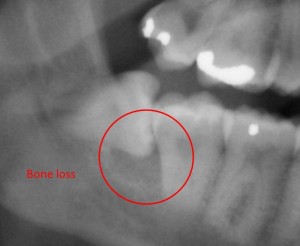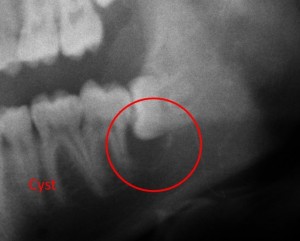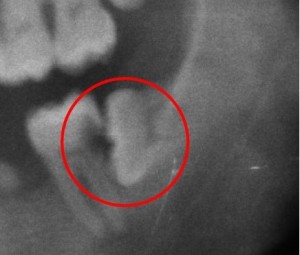The removal of wisdom teeth during the teen years and early 20’s is often recommended when symptoms and problems are present. Wisdom teeth pain is the most common symptom, but not the only reason dentists prescribe removal of the third molars. Here is what you need to know about wisdom teeth problems.
 Wisdom Teeth Pain
Wisdom Teeth Pain
The third molars, commonly known as wisdom teeth, come in during the teen years. Pain from eruption of the teeth is common. Sometimes the wisdom teeth do not come in all the way, a condition called ‘partial bony impaction’. In cases such as these, the tissue surrounding the exposed portion of the tooth can become chronically irritated and inflamed. If wisdom teeth cause pain, it is a good idea to have them evaluated by your dentist or oral surgeon to determine whether they need to be removed or not.
Infected Wisdom Teeth
Chronic infection of the soft tissue surrounding the exposed portion of an impacted wisdom tooth is called ‘pericoronitis’. When left untreated, the infection can lead to gum disease, eventually involving the second molars. It is not uncommon for gum disease to spread to the adjacent teeth, increasing the chances of losing the second molars in time. Gum disease is a bacterial infection that attacks the bone and gum tissue surrounding the teeth. As gum disease becomes more advanced, the bone is destroyed and gum tissue falls away. This advanced stage of gum disease can cause teeth to become loose and painful. Untreated gum disease almost always leads to tooth loss.

Bone loss behind second molar caused by impacted wisdom tooth
Damage to Adjacent Teeth
Impacted wisdom teeth which are malpositioned often put pressure on the adjacent second molars. Over time, this constant pressure can dissolve the roots of the second molars, leading to tooth decay and even tooth loss. When wisdom teeth are impacted horizontally (laying down sideways) the risk of damage to the second molars is high.
Cysts and Tumors Around Wisdom Teeth

a cyst causes bone loss around both second and third molar
Sometimes, impacted wisdom teeth develop pathology such as cysts and tumors. If this happens, it is important to remove the wisdom teeth to avoid damage to the jaw and teeth. Cysts and tumors destroy healthy bone and can weaken the jaw bone, involve the adjacent teeth and cause pain. In cases of advanced pathology, large cysts and tumors create a high risk of jaw fracture from the weakening of the jaw bone. Additionally, cysts and tumors should be examined microscopically by a pathologist to ensure the growths are not malignant.
Removing Wisdom Teeth to Preserve Orthodontic Results
Braces are expensive, and once they come off nobody wants their teeth to get crooked again. Orthodontists strongly recommend wearing orthodontic retainers for as long as possible following orthodontic treatment. This is because they know that teeth can still shift back into crowding and misalignment without retention. When wisdom teeth interfere with orthodontic results by placing pressure on adjacent teeth, they can cause orthodontic relapse. Many orthodontists recommend the removal of impacted wisdom teeth in conjunction with orthodontic treatment in order to prevent the teeth from become crowded or crooked once the braces re removed.

Decayed second molar caused by impacted wisdom tooth
Cavities in Wisdom Teeth
The wisdom teeth are the last molars, far back in the jaw. Their position makes dental hygiene more difficult. For this reason, wisdom teeth often become decayed and develop painful cavities. If this happens, the solution is often removal of the wisdom teeth, rather than repair. Because they are difficult to keep clean, decay is often recurring. Removing the decayed wisdom teeth makes it easier to keep the back teeth and gums healthy and cavity- free.
Do I Need My Wisdom Teeth Removed?
The best way to find out if your wisdom teeth are causing problems is to schedule a consultation with an oral surgeon. Your oral surgeon will take an x-ray to evaluate the position, health and identify any pathology that may be associated with the wisdom teeth. If problems exist, a plan will be recommended to remove them. Wisdom teeth removal is considered minor surgery, and can be done in the oral surgeon’s office while you sleep comfortably. Your doctor will review your medical history, explain the procedure and anesthesia, and give you special instructions to prepare for the procedure. Expect to rest the rest of the day and plan 2-3 days to recover from the surgery. For more information about wisdom teeth removal, visit our website.

